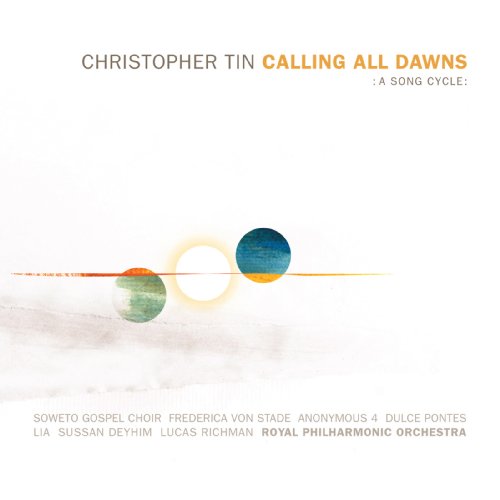
Christopher Tin: Calling All Dawns
Hoy, hoy! Calling All Dawns is Christopher Tin’s debut album and features 12 stunning songs in 12 different languages and in my opinion almost 12 different styles which is not surprising: “I’ve been traveling around the world for this album, working with some of the best singers and instrumentalists on five different continents”, says Tin. The lyrics are organized around such themes as life, death and rebirth.
You may have already heard the beautiful and inspiring “Madokara Mieru” from the new Corner Stone Cues album Ethon Path. This track was originally written by Christopher Tin and a slightly different version is included in Tin’s solo album Calling All Dawns. According to the composer on his blog, the story behind “Madokara Mieru” is that the guys over at Corner Stone Cues liked so much the early demo of the track that they made their own version, which has already been released in their album Eton Path.
“Corner Stone Cues, a music library that does licensing of music for movie trailers, heard an early demo of the song and liked it so much that they thought they could license it for a variety of uses; movie trailers, sports coverage, etc”, Christopher Tin explains. “And so with my permission, they recorded their own version of the song, months before I recorded my own. Their version has been released on an album called Corner Stone Cues Presents: Eton Path, which is available on iTunes, Amazon, Walmart, and a number of other places. Already it’s been licensed for use for the BBC’s coverage of the Premiere League FA Finals and the Beijing Summer Olympic Games, so if you happen to be a British sports fan, you might have heard it already.
What are the differences between the two versions? Theirs was recorded by the London Studio Orchestra at AIR Lyndhurst. Mine was recorded by the Royal Philharmonic Orchestra at Abbey Road Studios. Theirs features a British choir and percussion. Mine features an LA based taiko group and a Northern California based choir. Mine also has slightly different orchestrations and arrangements. So all in all, they’re not outrageously different.
[…] As for the lyrics, it’s sung in Japanese, and is based around a series of five Haiku, each corresponding to the changing seasons: spring, summer, autumn, winter and ending on spring. Each verse is sung by a singer in a different stage of their life; so a young girl sings the first spring verse, an adolescent girl sings about summer, an older woman sings about autumn, etc. The song ends with a return of the young girl singing about spring, therefore completing the cycle of the seasons. So in essence, it’s a song about the cycle of life.”
Trivia: Christopher Tin composed the famous track from the Civilization IV score, “Baba Yetu”.
![]() Calling All Dawns is available to the public for purchase in digital format through iTunes, and as physical CD on Amazon. For licensing information, contact Christopher Tin.
Calling All Dawns is available to the public for purchase in digital format through iTunes, and as physical CD on Amazon. For licensing information, contact Christopher Tin.









